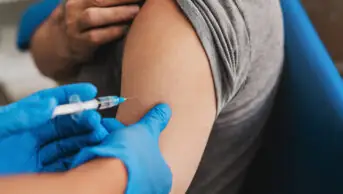
Shutterstock.com
New treatments offer new hope for patients and opportunities for pharmacists. The Pharmaceutical Journal reported that cell and gene therapies could save the NHS billions, while a new HIV prevention injection has been recommended for people unable to take oral pre-exposure prophylaxis (PrEP).
However, barriers remain to integrating proven treatments into routine pharmaceutical care. Pharmacists have shared their thoughts on why oral PrEP is struggling to find a home in UK primary healthcare —particularly community pharmacies — and proposed several solutions, while NHS figures report a ‘record number’ of prescriptions dispensed in England in 2024/2025 despite a reduction in the number of pharmacies. In a context of increasing pressures, The Pharmaceutical Journal’s 2025 salary and satisfaction survey found almost half of pharmacists do not access career support or training.
In addition to our in-depth news from this week, here’s a quick round-up of other health news that you might have missed.
Babies born up to ten weeks early can be fed milk from the start
The FEED1 trial, funded by the National Institute of Health and Care Research, has found that in infants born at 30+0 weeks to 32+6 weeks of gestation, full milk feeds from day one does not alter the length of hospital stay and does not increase the risk of necrotising enterocolitis or hypoglycaemia. Published in The Lancet Child and Adolescent Health, the results of the five-year, open-label, parallel-group, multi-centre, randomised, superiority trial across 46 UK neonatal units suggested that these babies “can be milk fed from the start, will not need intravenous nutrition and will likely spend less time in intensive care. They can be cared for in special care where families can be more involved and supported to establish breastfeeding”, according to lead investigator Shalini Ojha.
Further reading:
Give schools adrenaline autoinjectors, say researchers
An analysis of national prescribing data, published online in the Archives of Disease in Childhood, found that less than half of schoolchildren in England who are at risk of food-related anaphylaxis were prescribed an adrenaline auto-injector. Researchers estimated that providing schools with ‘spare’ devices would improve safety and save millions of pounds.
Further reading:
Menopause, hormones and health
Studies and abstracts presented at the Menopause Society’s national conference, held in Orlando, Florida on 21–25 October 2025, sparked conversations about hormones and health. One meta-analyisis found transdermal hormone therapy was associated with a lower incidence of anxiety and depression when compared to oral hormone therapy. And another abstract presented at the conference suggested a higher incidence of autoimmune disease in postmenopausal women using hormone therapy — but experts say more information is needed before drawing conclusions.
Further reading:
Protein changes could personalise prescribing for trans women
A study published in Nature Medicine examined 40 transgender individuals receiving feminising hormone therapy. It found that the hormones altered proteins in a way that showed the same directional changes as in menopausal women receiving hormone therapy. Study co-author Boris Novakovic said these impacts “may consequentially adjust disease susceptibility profiles in transgender women, including autoimmune and cardiovascular disorders.” Another study co-author, Ada Cheung, added: “By tracking protein biomarkers dynamically, clinicians might better calibrate hormone dosages, pre-emptively identify cardiovascular or immunological side effects, and enhance overall treatment efficacy.”
Further reading:
Colour-changing label to identify heat-damaged vaccines
Scientists at the University of Surrey have developed a heat-sensitive label that changes colour when a specified temperature is breached. The product is now being brought to market and could be a cost-effective way to identify if vaccines and other heat-sensitive medicines, such as cancer treatment, have been exposed to too much heat.


